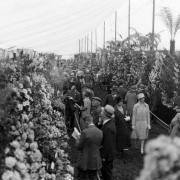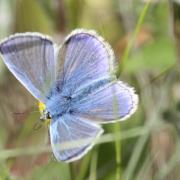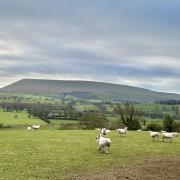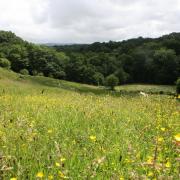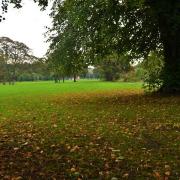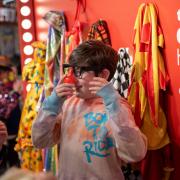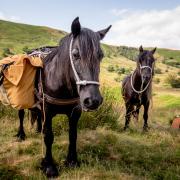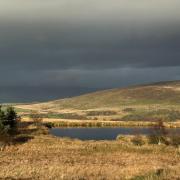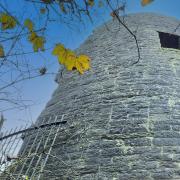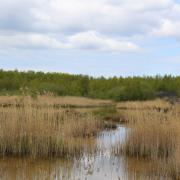Author Alison Boyle tells how she wove a story from her family’s connection with a revolutionary Lancashire-made fibre

The north west is well known for its cotton entrepreneurs like Richard Arkwright with his horse-drawn cotton spinning mill in Preston and ideas which influenced the design of modern factories. Much less well known is a branch of manufacturing that was born just a few years after Queen Victoria died.
Cotton was the main employer in textiles until the chemical formula for making artificial silk, or viscose, was discovered. The term viscose describes the smoothness or viscosity of the chemical liquid before it is regenerated, alchemy-like, into durable threads of lustrous yarn.
Artificially created silk is also known as rayon, from the French word for ray, bright, or beaming. In 1905 Courtaulds, based in Britain, was the first company in the world to create commercial viscose and they manufactured it here in Lancashire.
Scandinavian wood pulp was delivered from Preston’s railway station along a branch line to Courtaulds Red Scar works, where a complex process turned it into liquid viscose and finally, artificial silk.
However, by collaborating with my father who worked at Courtaulds for over 30 years, I published my first novel about this important regional industry. In ‘From Pakistan to Preston’, we carefully mixed factory facts with a fictional romance between Lancashire lad Tommy O’Reilly and a young woman from Mirpur called Sunehri Saleem.
At Courtaulds, off-white filaments of artificial silk were created first, an array of amazing shades came second, and the name labels third. These names not only describe the colour, but also reveal aspects of the lives of people like my mother and father who worked in the laboratory.
Saved by my father when the factory closed, these real artificial silk threads (that always sounds contradictory) are just a few of the 500 shades that were made here. And Celtic, Roe and Mikado are just a few of the Golds created by mixing specific quantities of pigment. In the book, we fabricated the shade name ‘Sunehri’ - the Urdu word for golden - to represent Tommy’s love for Sunehri Saleem.
There’s an interesting tale to be told about each, but here’s one for starters: my father loves Gilbert and Sullivan, and he acted and sang in many shows in Lancashire. As children, we were a little embarrassed to see him in thick white tights and buckled shoes - well before David Beckham modelled a sarong without shame. That’s my father’s writing on the label, above right, aptly named Mikado Gold.
But my interest goes much deeper than colours and names. The social context of Lancashire people making things, including my clog-wearing grandmothers who wove cotton for years in the same mill, connects us to our heritage. Set in the 1970s and the present-day, the novel ‘From Pakistan to Preston’ celebrates the region’s distant past in cotton as well as more recent stories of people born here.
They include Tommy’s fictional best friend Jacko and Gertie Godber, owner of the paper shop, alongside people who came north to work and, most importantly, to make things. The father of Tommy’s rival in love, Fons, stayed here after serving time as a prisoner of war on Moor Park in Preston. There’s the Polish gatekeeper Oskar and Pakistan-born Harry Manzoor and his family.
Melville Murphy’s sister is caught in Ireland’s 1972 conflict. The song lyrics written by my father, for the comical factory Drama Club scenes, hark right back to the days of music hall. Finally, the black and white photograph of a Mirpur hillside used on the book’s cover was taken by a real, present-day, MA graduate of UCLAN, Zill Niazi.
Courtaulds finally closed its gates in 1980 with the loss of many jobs, but we are continuing to celebrate the unique character of the North.
In the autumn we will be festooning the magnificent Victorian Engine Hall at the People’s History Museum, on the border between Salford and Manchester, with vibrant artificial silks and rarely seen photographs of Courtaulds taken by the works photographer. Please join us by visiting the Contact page on the Artificial Silk website.
The site of Preston’s Red Scar factory has now reopened. This time there are many smaller businesses rather than one, but as Arnold Schwarzenegger memorably anticipated, some things do come back. Taking pride in our shared regional history opens our minds and hearts to a rich tale of multiculturalism and manufacturing. It’s a tale we should never forget to celebrate.
Alison Boyle
The author of over 50 books, Alison Boyle teamed up with her father to launch From Pakistan to Preston. The name A. T. Boyle was created by combining ‘A’ for Alison and ‘T’ for Terry, her father, and it stuck. Her most recent book is The Typing Man, a special edition silver block-printed book produced in dual language Turkish and English by a family firm in the Lakes. For more information about her books go to www.artificialsilk.org




